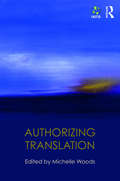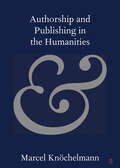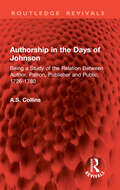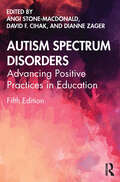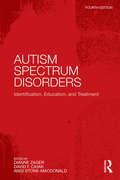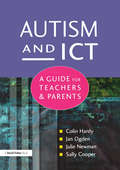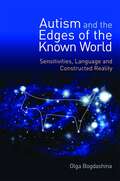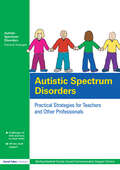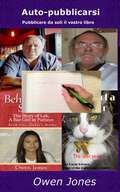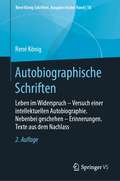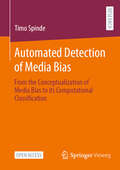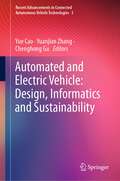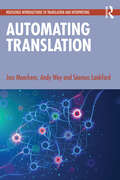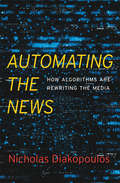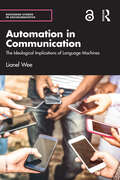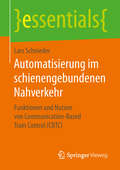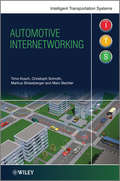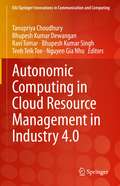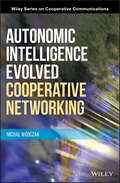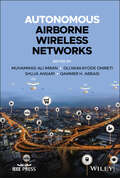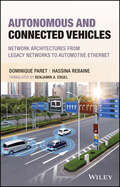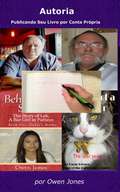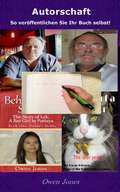- Table View
- List View
Authorizing Translation: The IATIS Yearbook (The IATIS Yearbook)
by Michelle WoodsAuthorizing Translation applies ground-breaking research on literary translation to examine the intersection between Translation Studies and literary criticism, rethinking ways in which analyzing translation and the authority of the translator can provide nuanced micro and macro readings of literary work and the worlds through which it moves. A substantial introduction surveys the field and suggests possible avenues for future research, while six case-study-based chapters by a new generation of Literature and Translation Studies scholars focus on the question of authority by asking: Who authors translations? Who authorizes translations? What authority do translations have in different cultural contexts? What authority does Literary Translation Studies have as a field? The hermeneutic role of the translator is explored through the literary periods of Romanticism, Modernism, and Postmodernism, and through different cultures and languages. The case studies focus on data-centered analysis of reviews of translated literature, ultimately illustrating how the translator’s authority creates and hybridizes literary cultures. Authorizing Translation will be of interest to students and researchers of Literary Translation and Translation Studies. Additional resources for Translation and Interpreting Studies are available on the Routledge Translation Studies Portal: http://cw.routledge.com/textbooks/translationstudies.
Authorship and Publishing in the Humanities (Elements in Publishing and Book Culture)
by Marcel KnöchelmannWhat is the point of publishing in the humanities? This Element provides an answer to this question. It builds on a unique set of quantitative and qualitative data to understand why humanities scholars publish. It looks at both basic characteristics such as publication numbers, formats, and perceptions, and differences of national academic settings alongside the influences of the UK's Research Excellence Framework and the German Exzellenzinitiative. The data involve a survey of more than 1,000 humanities scholars and social scientists in the UK and Germany, allowing for a comprehensive comparative study, and a series of qualitative interviews. The resulting critique provides scholars and policy makers with an accessible and critical work about the particularities of authorship and publishing in the humanities. And it gives an account of the problems and struggles of humanities scholars in their pursuit of contributing to discourse, and to be recognised with their intellectual work.
Authorship in the Days of Johnson: Being a Study of the Relation Between Author, Patron, Publisher and Public, 1726-1780 (Routledge Revivals)
by A.S. CollinsOriginally published in 1928, this book discusses the complex relationships between authors, patrons and publishers in the 18th Century and the ideals and struggles for copyright. It examines the power of booksellers over authors and the effect on authors of copyright security and the lapse of patronage.
Autism Spectrum Disorders: Advancing Positive Practices in Education
by David F. Cihak Dianne Zager Angi Stone-MacDonaldThe fifth edition of Autism Spectrum Disorders: Advancing Positive Practices in Education provides readers with a comprehensive and accessible understanding of current research and evidence-based practices in autism spectrum disorders (ASD), linking research, theory, and practice. This new edition includes new chapters on trauma and co-morbidity, current trends in autism research, social media, neurodiversity, and aging in people with ASD. It also features updated content on international contexts and culturally sustaining and relevant practices. Aligned with DSM-5 diagnostic criteria, this text continues to be critical reading for students and researchers in special and inclusive education programs.
Autism Spectrum Disorders: Identification, Education, and Treatment
by Angi Stone-Macdonald David F. Cihak Dianne ZagerThe field of autism has been growing at an unprecedented rate in recent years. In addition to an actual rise in the number of classic DSM-IV cases, broadened diagnostic criteria have uncovered a wider range of autistic behaviors and ability levels. The third edition of this well-known text continues the mission of its predecessors--to present a comprehensive, readable, up-to-date overview of the field of autism, one that links research, theory, and practice in ways that are accessible to both practitioners and parents. Key features include:*Expanded Coverage--To accommodate the recent explosion of research, the book has been expanded from 11 to 14 chapters that examine the impact of autism on the individual and the family from infancy through adulthood.*Expertise--Internationally recognized experts offer cutting-edge treatment and educational information on topics such as early diagnosis, medical treatment, assessment, educational methods, language development, behavior regulation, and family support.*Neurobiological Research--Comprehensive medical research and treatment chapters provide an understandable overview of neurobiological research and current treatments including when and how medication can be employed as part of a treatment plan.*Focus on Early Years--Old sections I and III have been combined and a new 3-chapter section on early identification and intervention added.*Focus on Parents and Families--In addition to a chapter on the evolving role of families, a new chapter addresses family needs during the preschool years.*Integration of Assessment and Intervention--The chapters on assessment and intervention have been reorganized and more closely integrated in keeping with current thinking about their inter-relatedness.*Future Directions--Two chapters discuss emerging directions in this exploding field and how to make informed decisions among a variety of approaches.This book is appropriate for anyone--students, practitioners, or parents--who must provide care for an autistic child.
Autism and ICT: A Guide for Teachers and Parents
by Julie Newman Sally Cooper Colin Hardy Jan OgdenThis book offers a practical approach for staff and carers who want to develop the use of ICT for children on the autistic spectrum and for those with language and communication difficulties. It combines descriptions of current research and literature on the subject of autism and ICT with practical guidance on software and hardware. A practical approach encourages experimentation, values the skills and attributes that participants bring and minimizes the technical barrier to ICT use. It includes concise information on what autism is, and examples of a range of pupils and their typical learning behaviors. It offers advice on how ICT can relate to various aspects of autism, information on concept keyboards and touch-sensitive screens and switches, and help with buying a computer and using the internet. Teachers, carers and parents of children with autism or language and communication problems will find lots of useful suggestions and advice on how to use ICT to help access the curriculum.
Autism and the Edges of the Known World
by Olga BogdashinaIn this intelligent and incisive book, Olga Bogdashina explores old and new theories of sensory perception and communication in autism. Drawing on linguistics, philosophy, neuroscience, psychology, anthropology and quantum mechanics, she looks at how the nature of the senses inform an individual's view of the world, and how language both reflects and constructs that view. Examining the 'whys' and 'hows' of the senses, and the role of language, Olga Bogdashina challenges common perceptions of what it means to be 'normal' and 'abnormal'. In doing so she shows that autism can help to illuminate our understanding of what it means to be human, and of how we develop faculties that shape our cognition, language, and behaviour. In the final chapter, she explores phenomena often associated with the paranormal - including premonitions, telepathy and déjà vu - and shows that these can largely be explained in natural terms. This book will appeal to anyone with a personal or professional interest in autism, including students and researchers, clinical practitioners, individuals on the autism spectrum and their families, teachers, speech and occupational therapists, and other professionals.
Autistic Spectrum Disorders: Practical Strategies for Teachers and Other Professionals
by Northumberland County Council Communication Support Services, UKThis book offers helpful categorization of problem areas, solutions that allow teachers to help children promptly and effectively, advice on setting IEP targets, and photocopiable resources.
Auto-Pubblicarsi: Pubblicare da soli il vostro libro
by Owen JonesAuto-Pubblicarsi Pubblicare da soli il vostro libro Questo libro è per tutti quegli autori che hanno paura di pubblicare i loro libri sia in formato cartaceo che elettronico o entrambi. Ho pubblicato più di cento libri in tutti i maggiori editori e distributori, ed è stata una sorpresa quando ho recentemente scoperto che alcuni scrittori eccellenti sono scoraggiati dall'auto-pubblicarsi perché pensano che il compito sia troppo difficile e confuso, e quindi preferiscono pagare qualcun’altro perché lo faccia per loro. Potrei capirlo se un autore volesse risparmiare tempo, quindi lo scopo di questo libro è quello di aiutare colore che desiderano fare il lavoro da soli, ma non sanno come. Dà veramente molta soddisfazione concepire l’idea di un libro, scriverlo e poi pubblicarlo tutto da soli, e grazie all’aiuto di questo libro, sarà esattamente quello che sarete in grado di fare. Al suo interno imparerete come pubblicarvi nei maggiori distributori come Amazon, iBookstore, Barnes and Noble, Lulu, Nook, Kindle, Smashwords e XinXii.
Autobiographische Schriften: Leben im Widerspruch Versuch einer intellektuellen Autobiographie. Nebenbei geschehen Erinnerungen. Texte aus dem Nachlass (René König Schriften. Ausgabe letzter Hand #18)
by René KönigGeboren im Kaiserreich, aufgewachsenen in der Weimarer Republik, geprägt vom Widerstand gegen den Nationalsozialismus und den Jahren der Emigration in der Schweiz, kehrte René König 1953 nach Deutschland zurück und wurde zu einem der Wiederbegründer der deutschen Soziologie. Die 1980 zuerst veröffentlichte Autobiographie "Leben im Widerspruch" beschreibt die einzelnen Etappen dieses Lebensweges, die Schulzeit in Danzig mit seinem polnischen Hinterland, die Studienjahre in Wien, Berlin und Paris und die vielfältige Tätigkeit als akademischer Lehrer in Europa, Amerika und Asien, die Reisen des jungen Studenten in die Länder des Nahen Ostens, die Begegnung mit der Kultur Siziliens, Erfahrungen als Betreuer eines bundesdeutschen Entwicklungshilfeprojektes in Afghanistan und die Auseinandersetzung mit den indianischen Kulturen im Südwesten der USA. Der zweite, bisher unveröffentlichte Text entstammt einer im Nachlass befindlichen unvollendeten Autobiographie, die mehr persönlich gehalten werden sollte und den Charakter von "Erinnerungen" hat. An ihr hat René König bis ungefähr 1990 gearbeitet. Der Titel "Nebenbei geschehen" stammt von ihm. Behandelt werden in diesen Kapiteln die Lebensabschnitte in Danzig, Berlin und in Zürich.
Automated Detection of Media Bias: From the Conceptualization of Media Bias to its Computational Classification
by Timo SpindeThis Open Access book explores the automated identification of media bias, particularly focusing on bias by word choice in digital media. The increasing prevalence of digital information presents opportunities and challenges for analyzing language, with cultural, geographic, and contextual factors shaping how content is portrayed. Despite the interdisciplinary nature of media bias research across fields like linguistics, psychology, and computer science, existing work often tackles the problem from limited perspectives, lacking comprehensive frameworks and reliable datasets. The book aims to advance the field by addressing these gaps and proposing a systematic approach to media bias detection. It develops feature-based and deep-learning approaches for automated bias detection, including a BERT-based model and MAGPIE, a multi-task learning model. These methods demonstrate improved performance on established benchmarks, showcasing the potential of deep learning in detecting media bias. Finally, the author addresses the practical applications of automated bias detection, such as enhancing news reading with forewarning messages, text annotations, and political classifiers, and examines the impact of bias on social media engagement.
Automated and Electric Vehicle: Design, Informatics and Sustainability (Recent Advancements in Connected Autonomous Vehicle Technologies #3)
by Yue Cao Yuanjian Zhang Chenghong GuThis book focuses on the design, informatics, and energy sustainability of automated and electric vehicles. Both principles and engineering practice have been addressed, from design perspectives toward informatics enabled transport service operation including automated valet parking and charging use cases. This is achieved by providing an in-depth study on a number of major topics such as battery management, eco-driving system, telecommunications, transport and charging services, cyber-security, etc. The book benefits researchers, engineers, and graduate students in the fields of the intelligent transport system, telecommunication, cyber-security, and smart grids.
Automating Translation (Routledge Introductions to Translation and Interpreting)
by Joss Moorkens Andy Way Séamus LankfordTranslation technology is essential for translation students, practising translators, and those working as part of the language services industry, but looming above others are the tools for automating translation: machine translation and, more recently, generative AI based on large language models (LLMs).This book, authored by leading experts, demystifies machine translation, explaining its origins, its training data, how neural machine translation and LLMs work, how to measure their quality, how translators interact with contemporary systems for automating translation, and how readers can build their own machine translation or LLM. In later chapters, the scope of the book expands to look more broadly at translation automation in audiovisual translation and localisation. Importantly, the book also examines the sociotechnical context, focusing on ethics and sustainability. Enhanced with activities, further reading and resource links, including online support material on the Routledge Translation studies portal, this is an essential textbook for students of translation studies, trainee and practising translators, and users of MT and multilingual LLMs.
Automating the News: How Algorithms Are Rewriting the Media
by Nicholas DiakopoulosFrom hidden connections in big data to bots spreading fake news, journalism is increasingly computer-generated. Nicholas Diakopoulos explains the present and future of a world in which algorithms have changed how the news is created, disseminated, and received, and he shows why journalists—and their values—are at little risk of being replaced.
Automation in Communication: The Ideological Implications of Language Machines (Routledge Studies in Sociolinguistics)
by Lionel WeeBy drawing on multiple examples from healthcare, religion, service encounters and poetry, Lionel Wee presents rich insights into the use of automation in communication through a posthumanist lens. As communication becomes increasingly automated, the use of automation creates significant conceptual challenges for ideologies about language, beliefs about the nature of language, as well as assumptions about the roles that interpretation, anthropomorphism, and folk theories of mind play when language is used in communication. This book unravels the ideological implications of automation in communication and provides a new theoretical ground to address the major issues raised by automation. Wee discusses the importance of thinking carefully about how we identify and distinguish the roles of speaker and hearer. He also argues that we re-evaluate our understanding of the relationship between language and community.This book will be vital to students interested in studying the intersections of AI, language and communication, as well as researchers working in communication studies, linguistics and the broader sociology of language in the age of technological change.
Automation, Communication and Cybernetics in Science and Engineering 2015/2016
by Sabina Jeschke Ingrid Isenhardt Frank Hees Klaus HenningAutomation, Communication and Cybernetics in Science and Engineering 2015/2016
Automatisierung im schienengebundenen Nahverkehr: Funktionen und Nutzen von Communication-Based Train Control (CBTC) (essentials)
by Lars SchniederInnerstädtische Schienenverkehrssysteme stoßen bei steigender Verkehrsnachfrage zunehmend an ihre Grenzen. Die Sicherheit und die Leistungsfähigkeit dieser Verkehrssysteme werden wesentlich durch die eingesetzte Leit- und Sicherungstechnik bestimmt. Eine Ausweitung des Verkehrsangebots erfordert leistungsfähige signaltechnische Systeme, die als Communications-Based Train Control (CBTC) bezeichnet werden. Lars Schnieder stellt in diesem essential die Systemumgebung dar, in die sich die CBTC-Systeme in Nahverkehrsunternehmen integrieren. Darüber hinaus leitet er her, welchen Beitrag die einzelnen Sicherungsfunktionen von CBTC-Lösungen zur Gefährdungsbeherrschung leisten. Auf dieser Grundlage zeigt der Autor, wie mit zunehmender Automatisierung sukzessive ein höherer Funktionsumfang von technischen Systemen übernommen wird. Zum Abschluss diskutiert er an CBTC-Systeme gestellte nicht-funktionale Anforderungen wie Sicherheit, Verfügbarkeit, Leistungsfähigkeit und Wirtschaftlichkeit.Der Autor: Dr.-Ing. Lars Schnieder verantwortet in einer Software-Entwicklungsfirma das Geschäftsfeld Sicherheitsbegutachtung. Er ist international als anerkannter Sachverständiger für Zugsicherungsanlagen tätig.
Automotive Inter-networking
by Marc Bechler Timo Kosch Markus Strassberger Christoph SchrothA complete introduction tocar-to-X communications networkingAutomotive Inter-networking will introduce a range of new network and system technologies for vehicle safety, entertainment and comfort systems currently being researched and developed. C2X networking is not only a matter of technology, but is also very closely related to policy-making about deployment. This book will provide the background on technical developments but will also discuss the potential benefits, costs and risks. Also discussed will be concepts related to application of vehicle-to-vehicle and vehicle-to-infrastructure communication technologies for various purposes such as automobile safety enhancement, vehicle user applications for comfort and convenience and efficiency along with other potential commercial applications.Application domains will build the starting point for an analysis of the requirements on suitable mobile network technology and the book will look at how well existing and new systems match these requirements. New automotive-specific technologies are presented in detail, explaining millimeter wave short range systems and special automotive network protocols. Specially designed system services and security mechanisms are introduced and system architecture, radio spectrum use, medium access control, network protocols and security concepts and considered. Finally, the book will present the current world-wide standardization activities, deployment strategies and an outlook about the evolvement of inter-vehicle communications in the next decades.Presents a comprehensive top-down approach to the newly evolving car-to-X communications networkingProvides a broad overview of all relevant C2X communication topicsWritten by well known experts in the fieldPredicts the outlook of the evolvement of inter-vehicle communications in the next decadesIncludes illustrations and high-level technical sketches of application domains and photographs, 3D renderings and professional graphical sketches of current prototypes
Autonomic Computing in Cloud Resource Management in Industry 4.0 (EAI/Springer Innovations in Communication and Computing)
by Nguyen Gia Nhu Tanupriya Choudhury Ravi Tomar Teoh Teik Toe Bhupesh Kumar Dewangan Bhupesh Kumar SinghThis book describes the next generation of industry—Industry 4.0—and how it holds the promise of increased flexibility in manufacturing, along with automation, better quality, and improved productivity. The authors discuss how it thus enables companies to cope with the challenges of producing increasingly individualized products with a short lead-time to market and higher quality. The authors posit that intelligent cloud services and resource sharing play an important role in Industry 4.0 anticipated Fourth Industrial Revolution. This book serves the different issues and challenges in cloud resource management CRM techniques with proper propped solution for IT organizations. The book features chapters based on the characteristics of autonomic computing with its applicability in CRM. Each chapter features the techniques and analysis of each mechanism to make better resource management in cloud.
Autonomic Intelligence Evolved Cooperative Networking (Wiley Series on Cooperative Communications)
by Michal WodczakAutonomic Intelligence Evolved Cooperative Networking offers a comprehensive advancement of the state-of-the art technological developments in the fields of Cooperative Networking and Autonomic Computing. Based on his track record in industrial standardisation, as well as academic and applied research, the author presents a fully-fledged Autonomic Cooperative Networking Architectural Model that encompasses the relevant workings of both the Layers of the Open Systems Interconnection Reference Model and the Levels of the Generic Autonomic Network Architecture. .
Autonomous Airborne Wireless Networks (Wiley - IEEE)
by Muhammad Ali ImranDiscover what lies beyond the bleeding-edge of autonomous airborne networks with this authoritative new resource Autonomous Airborne Wireless Networks delivers an insightful exploration of recent advances in the theory and practice of using airborne wireless networks to provide emergency communications, coverage and capacity expansion, information dissemination, and more. The distinguished engineers and editors have selected resources that cover the fundamentals of airborne networks, including channel models, recent regulation developments, self-organized networking, AI-enabled flying networks, and notable applications in a variety of industries. The book evaluates advances in the cutting-edge of unmanned aerial vehicle wireless network technology while offering readers new ideas on how airborne wireless networks can support various applications expected of future networks. The rapidly developing field is examined from a fresh perspective, one not just concerned with ideas of control, trajectory optimization, and navigation. Autonomous Airborne Wireless Networks considers several potential use cases for the technology and demonstrates how it can be integrated with concepts from self-organized network technology and artificial intelligence to deliver results in those cases. Readers will also enjoy: A thorough discussion of distributed drone base station positioning for emergency cellular networks using reinforcement learning (AI-enabled trajectory optimization) An exploration of unmanned aerial vehicle-to-wearables (UAV2W) indoor radio propagation channel measurements and modelling An up-to-date treatment of energy minimization in UAV trajectory design for delay tolerant emergency communication Examinations of cache-enabled UAVs, 3D MIMO for airborne networks, and airborne networks for Internet of Things communications Perfect for telecom engineers and industry professionals working on identifying practical and efficient concepts tailored to overcome challenges facing unmanned aerial vehicles providing wireless communications, Autonomous Airborne Wireless Networks also has a place on the bookshelves of stakeholders, regulators, and research agencies working on the latest developments in UAV communications.
Autonomous and Connected Vehicles: Network Architectures from Legacy Networks to Automotive Ethernet
by Dominique Paret Hassina RebaineAUTONOMOUS AND CONNECTED VEHICLES Discover the latest developments in autonomous vehicles and what the future holds for this exciting technology In Autonomous and Connected Vehicles, networking experts Dominique Paret and Hassina Rebaine deliver a robust exploration of the major technological changes taking place in the field, and describe the different levels of autonomy possible with current technologies and the legal and regulatory contexts in which new autonomous vehicles will circulate. The book also includes discussions of the sensors, including infrared, ultrasound, cameras, lidar, and radar, used by modern autonomous vehicles. Readers will enjoy the intuitive descriptions of Advanced Driver Assistance Systems (ADAS), network architectures (CAN-FD, FlexRay, and Backbone Ethernet), and software that power current and future autonomous vehicles. The authors also discuss how ADAS can be fused with data flowing over newer and faster network architectures and artificial intelligence to create greater levels of autonomy. The book also includes: A thorough introduction to the buzz and hype surrounding autonomous and connected vehicles, including a brief history of the autonomous vehicle Comprehensive explorations of common issues affecting autonomous and connected vehicles, including regulatory guidelines, legislation, relevant norms and standards, and insurance issues Practical discussions of autonomous vehicle sensors, from DAS to ADAS and HADAS, and VA L3 to L5 In-depth examinations of networks and architecture, including discussions of data fusion, artificial intelligence, and hardware architecture in vehicles Perfect for graduate and undergraduate students in programs dealing with the intersection of wireless communication technologies and vehicles, Autonomous and Connected Vehicles is also a must-read reference for industry professionals and researchers seeking a one-stop reference for the latest developments in vehicle communications technology.
Autopublicar desde principiante a Profesional pagado: Uno hoja de ruta clara para quienes aspiran a autores independientes
by Bolakale Aremu Charles Johnson Jr¡Ha llegado el momento de dar rienda suelta a tu Autor empresario!
Autoria: Publicando Seu Livro por Conta Própria
by Owen JonesAutoria Publicando Seu Livro por Conta Própria Este livro é para todos os autores que temem publicar seus livros, seja em formato impresso, eletrônico ou ambos. Já publiquei mais de uma centena de livros com todas as principais gráficas e distribuidoras; então, foi uma surpresa quando soube, recentemente, que alguns escritores excelentes se afastam da auto-publicação por acharem a tarefa muito confusa e difícil, e, por isso, pagam a outros para fazer por eles. Posso entender isso se um autor deseja economizar tempo e, portanto, o objetivo deste livro é ajudar aqueles que gostariam de fazer o trabalho eles mesmos, mas não sabem como. Na verdade, é muito gratificante conceber a idéia de um livro, escrevê-lo e depois publicá-lo sozinho, e, com a ajuda deste livro, é exatamente isso que você poderá fazer. Dentro, você aprenderá a publicar em todos os principais distribuidores, como Amazon, iBookstore, Barnes & Noble, Lulu, Nook, Kindle, Smashwords e XinXii.
Autorschaft: So veröffentlichen Sie Ihr Buch selbst!
by Owen JonesAutorschaft So veröffentlichen Sie Ihr Buch selbst! Dieses Buch richtet sich an alle Autoren, die ihre Bücher in gedruckter oder elektronischer Form oder in beiden Formaten selbst veröffentlichen möchten, aber sich nicht trauen. Ich selbst habe über hundert Bücher bei allen großen Druckereien und Vertreibern veröffentlicht, daher war ich überrascht, vor Kurzem zu erfahren, dass einige exzellente Schriftsteller die Selbstveröffentlichung ablehnen, weil sie die Aufgabe als zu verwirrend und schwierig empfinden und sie lieber andere bezahlen um dies für sie zu erledigen. Ich kann es verstehen, wenn ein Autor Zeit sparen möchte, daher ist der Zweck dieses Buches, denen zu helfen, die den Job selbst erledigen möchten, aber nicht wissen, wie. Es ist tatsächlich sehr befriedigend, die Idee für ein Buch zu empfangen, es zu schreiben und dann selbst zu veröffentlichen und mit Hilfe dieses Buches können Sie genau das tun. Hier erfahren Sie, wie Sie Veröffentlichungen auf allen wichtigen Verteilern wie Amazon, iBookstore, Barnes und Noble, Lulu, Nook, Kindle, Smashwords und XinXii vornehmen können.
